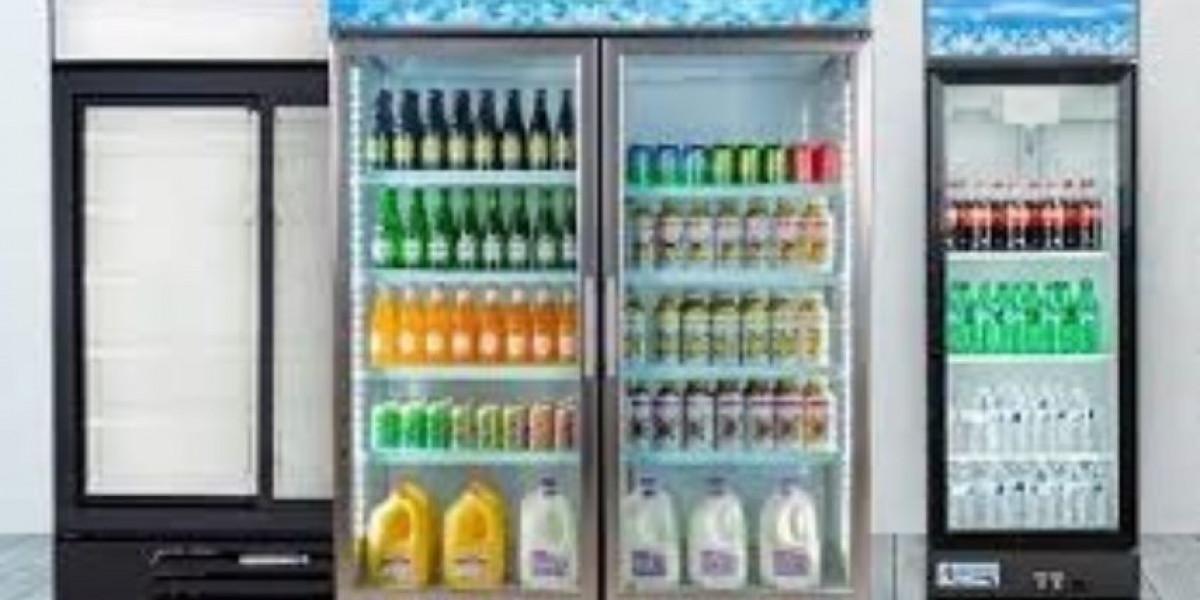Introduction
Commercial fridges are essential appliances in the food service, retail, and hospitality industries. They play a critical role in preserving the quality of perishable goods, ensuring food safety, and maintaining efficient operations. This article explores the various types, features, applications, benefits, challenges, innovations, and future trends in commercial refrigeration. Whether you are a restaurant owner, a supermarket manager, or a hotel operator, understanding the nuances of commercial fridges will help you make informed decisions and optimize your operations.
Types of Commercial Fridges
Upright Fridges
Upright fridges, also known as reach-in refrigerators, are vertical units that provide ample storage space and easy access to stored items. They are ideal for busy kitchens where quick retrieval of ingredients is essential.
Counter Fridges
Counter fridges combine refrigeration with worktop space, making them perfect for kitchens with limited space. They allow chefs to prepare food directly on top of the fridge, enhancing efficiency and convenience.
Display Fridges
Display fridges are designed to showcase products while keeping them cool. Commonly used in retail settings, these fridges feature transparent doors or open fronts to attract customers and boost sales.
Under-Counter Fridges
Under-counter fridges are compact units that fit under kitchen counters, providing additional refrigerated storage without taking up valuable floor space. They are ideal for small kitchens and bars.
Walk-In Coolers
Walk-in coolers are large, enclosed spaces used for storing bulk quantities of perishable goods. They are commonly found in restaurants, supermarkets, and warehouses, offering extensive storage capacity.
Bar Fridges
Bar fridges are small, compact units designed to store beverages. They are commonly used in bars, pubs, and hotels to keep drinks chilled and easily accessible.
Blast Chillers
Blast chillers rapidly lower the temperature of hot food to safe levels, preventing bacterial growth and preserving food quality. They are essential in commercial kitchens for ensuring food safety.
Wine Coolers
Wine coolers, also known as wine refrigerators, are specialized units designed to store wine at optimal temperatures. They are used in restaurants, bars, and homes to preserve the flavor and quality of wine.
Key Features and Specifications
Temperature Control
Accurate temperature control is crucial for maintaining the quality and safety of stored items. Commercial fridges are equipped with advanced thermostats and temperature monitoring systems to ensure consistent cooling.
Energy Efficiency
Energy efficiency is a significant consideration for commercial fridges, as they operate continuously. Energy-efficient models reduce operating costs and minimize environmental impact.
Size and Capacity
Commercial fridges come in various sizes and capacities to suit different needs. Choosing the right size depends on the volume of goods you need to store and the available space in your establishment.
Construction Material
Durable construction materials, such as stainless steel, are essential for commercial fridges to withstand heavy use and ensure longevity. Stainless steel is also easy to clean and maintain.
Shelving and Storage Options
Adjustable shelving and storage options allow for flexible organization of items. Wire racks, solid shelves, and specialized compartments help maximize storage space and improve accessibility.
Door Types and Configurations
Commercial fridges feature different door types, including solid doors, glass doors, and sliding doors. The choice of door type depends on the intended use and the need for visibility and accessibility.
Applications in Different Industries
Restaurants and Cafes
In restaurants and cafes, commercial fridges are used to store ingredients, prepared meals, and beverages. They are essential for maintaining food quality and safety in fast-paced kitchen environments.
Supermarkets and Grocery Stores
Supermarkets and grocery stores use commercial fridges to display and store perishable products, such as dairy, meat, and produce. These fridges ensure that products remain fresh and appealing to customers.
Bars and Pubs
Bars and pubs rely on commercial fridges to keep beverages chilled and readily available. From beer fridges to wine coolers, these appliances play a vital role in beverage service.
Hotels and Resorts
Hotels and resorts use commercial fridges in their kitchens, restaurants, and guest rooms. These fridges support food service operations and enhance guest experience by providing convenient access to refreshments.
Catering Services
Catering services use commercial fridges to transport and store food safely. Portable refrigeration units ensure that food remains fresh during events and functions.
Medical and Pharmaceutical Storage
In the medical and pharmaceutical industries, commercial fridges are used to store temperature-sensitive items, such as vaccines, medications, and lab samples. Precise temperature control is critical in these applications.
Benefits of Using Commercial Fridges
Preserving Food Quality
Commercial fridges help preserve the quality and freshness of food by maintaining optimal temperatures and humidity levels. This ensures that food retains its flavor, texture, and nutritional value.
Enhancing Operational Efficiency
By providing organized and accessible storage, commercial fridges enhance operational efficiency in kitchens and retail environments. Quick access to ingredients and products reduces preparation time and improves service speed.
Reducing Waste
Proper refrigeration reduces food spoilage and waste. By extending the shelf life of perishable goods, commercial fridges help businesses save money and reduce their environmental footprint.
Complying with Health Regulations
Health regulations require the proper storage of perishable goods to prevent foodborne illnesses. Commercial fridges ensure compliance with these regulations by maintaining safe temperatures and hygienic conditions.
Energy Savings
Energy-efficient commercial fridges reduce electricity consumption and lower operating costs. Investing in energy-efficient models can lead to significant savings over time.
Extending Product Shelf Life
By maintaining stable temperatures, commercial fridges extend the shelf life of perishable goods. This allows businesses to manage inventory more effectively and reduce losses due to spoilage.
Challenges and Considerations
Initial Investment Costs
The initial cost of purchasing commercial fridges can be high. However, the long-term benefits, such as improved efficiency and reduced waste, often outweigh the initial investment.
Maintenance Requirements
Regular maintenance is essential to keep commercial fridges in optimal condition. This includes cleaning, checking seals, and servicing components to prevent breakdowns and ensure longevity.
Space Constraints
Space constraints can be a challenge when installing commercial fridges. It is important to measure the available space and choose a fridge that fits without compromising functionality or accessibility.
Noise Levels
Some commercial fridges can be noisy, which may be disruptive in certain environments. Considering the noise levels of different models is important, especially in settings where quiet operation is desired.
Energy Consumption
Commercial fridges consume significant amounts of energy due to continuous operation. Choosing energy-efficient models and implementing energy-saving practices can help mitigate this issue.
Latest Innovations in Commercial Refrigeration
Smart Fridges
Smart fridges feature advanced technologies, such as remote temperature monitoring, inventory tracking, and automated defrosting. These innovations improve efficiency and provide valuable data for managing operations.
Eco-Friendly Refrigerants
The use of eco-friendly refrigerants reduces the environmental impact of commercial fridges. These refrigerants have lower global warming potential and are increasingly adopted in modern refrigeration systems.
Advanced Temperature Monitoring Systems
Advanced temperature monitoring systems provide real-time data on the internal conditions of commercial fridges. This helps ensure consistent cooling and allows for quick adjustments if needed.
Energy-Efficient Compressors
Energy-efficient compressors reduce electricity consumption and operating costs. These compressors are designed to provide reliable cooling while minimizing energy use.
IoT Integration
IoT integration allows commercial fridges to connect to the internet and communicate with other devices. This enables remote monitoring, predictive maintenance, and improved overall management.
Future Trends in Commercial Fridges
Sustainability and Green Technology
Sustainability and green technology are driving innovations in commercial refrigeration. Manufacturers are focusing on developing eco-friendly models that reduce energy consumption and minimize environmental impact.
Automation and AI in Refrigeration
Automation and AI are revolutionizing commercial refrigeration by enabling predictive maintenance, automated temperature adjustments, and inventory management. These technologies enhance efficiency and reduce manual labor.
Enhanced Connectivity
Enhanced connectivity allows commercial fridges to integrate with other systems, such as inventory management and ordering systems. This streamlines operations and improves overall efficiency.
Modular Designs
Modular designs offer flexibility in configuring commercial fridges to meet specific needs. Businesses can customize their refrigeration units to fit their space and operational requirements.
Customization Options
Customization options allow businesses to choose features and configurations that best suit their needs. This includes selecting door types, shelving arrangements, and temperature settings.
Choosing the Right Commercial Fridge
Assessing Your Needs
Assessing your needs is the first step in choosing the right commercial fridge. Consider factors such as the type of products you need to store, the volume of goods, and the available space.
Budget Considerations
Budget considerations play a crucial role in selecting a commercial fridge. While initial costs are important, also consider the long-term savings from energy-efficient models and reduced waste.
Space Availability
Space availability is a key factor in choosing a commercial fridge. Measure the space where the fridge will be installed and ensure there is adequate clearance for ventilation and accessibility.
Brand Reputation
Brand reputation is an important consideration when purchasing a commercial fridge. Choose reputable brands known for quality, reliability, and excellent customer service.
Warranty and Service
Warranty and service options are essential for ensuring long-term performance and reliability. Look for models that come with comprehensive warranties and easy access to service and support.
Maintenance and Care Tips
Regular Cleaning Routines
Regular cleaning routines are essential for maintaining the hygiene and efficiency of commercial fridges. Clean the interior and exterior surfaces, shelves, and door seals regularly to prevent buildup of dirt and bacteria.
Temperature Monitoring
Consistently monitor the temperature of your commercial fridge to ensure it remains within safe ranges. Use digital thermometers and check temperatures daily to maintain food safety.
Checking Seals and Gaskets
Inspect seals and gaskets regularly for signs of wear or damage. Damaged seals can cause temperature fluctuations and increase energy consumption, so replace them as needed.
Scheduling Professional Maintenance
Schedule professional maintenance at least once a year to keep your commercial fridge in optimal condition. Professional technicians can identify and address potential issues before they lead to breakdowns.
Dealing with Common Issues
Common issues with commercial fridges include temperature fluctuations, frost buildup, and unusual noises. Address these issues promptly by consulting the user manual or seeking professional assistance.
Case Studies
Successful Implementation in a Restaurant
A high-end restaurant faced challenges with maintaining food quality due to inadequate refrigeration. After installing advanced commercial fridges, they saw a significant improvement in food freshness and a reduction in waste, resulting in increased customer satisfaction and cost savings.
A Grocery Store’s Refrigeration Overhaul
A local grocery store underwent a refrigeration overhaul, replacing outdated units with energy-efficient models. This led to lower energy bills, better product preservation, and compliance with new health regulations, boosting the store's reputation and profitability.
Innovative Use in a Hotel’s Kitchen
A luxury hotel integrated smart fridges into their kitchen operations, enabling remote temperature monitoring and inventory management. This innovation enhanced operational efficiency, reduced food waste, and improved guest satisfaction through consistent food quality.
Expert Insights
Quotes from Industry Professionals
"Investing in high-quality commercial fridges is essential for any food service business. The right refrigeration solutions can significantly impact food safety, operational efficiency, and overall profitability." - John Smith, Restaurant Consultant
Advice on Maximizing Fridge Efficiency
"To maximize the efficiency of your commercial fridge, ensure regular maintenance, keep the doors closed as much as possible, and avoid overloading the unit. Proper organization and temperature monitoring are also crucial." - Jane Doe, Refrigeration Expert
Tips for Extending Fridge Lifespan
"Extending the lifespan of your commercial fridge involves regular cleaning, timely repairs, and using energy-efficient practices. Avoid placing hot items directly in the fridge and ensure proper ventilation around the unit." - Mark Johnson, Maintenance Specialist
Frequently Asked Questions (FAQs)
How to Choose the Right Size Commercial Fridge?
Choosing the right size commercial fridge depends on your storage needs and available space. Assess the volume of products you need to store and measure the installation area to ensure a proper fit.
What is the Average Lifespan of a Commercial Fridge?
The average lifespan of a commercial fridge ranges from 10 to 15 years. Regular maintenance and proper usage can extend its lifespan, while neglect and heavy use can shorten it.
How Often Should a Commercial Fridge Be Serviced?
A commercial fridge should be serviced at least once a year by a professional technician. Regular servicing helps identify potential issues and maintain optimal performance.
What Are the Signs That a Commercial Fridge Needs Repair?
Signs that a commercial fridge needs repair include temperature fluctuations, unusual noises, frost buildup, and increased energy consumption. Address these issues promptly to prevent further damage.
Are Energy-Efficient Models Worth the Extra Cost?
Energy-efficient models are worth the extra cost due to their long-term savings on electricity bills and reduced environmental impact. They also often come with advanced features that enhance performance and reliability.
Conclusion
In conclusion, commercial fridges are indispensable assets for businesses in the food service, retail, and hospitality industries. Choosing the right type and model of commercial fridge can significantly impact your operations, ensuring food safety, reducing waste, and improving efficiency. By understanding the features, benefits, and maintenance requirements, you can make informed decisions that enhance the success of your business. Stay updated with the latest innovations and trends in commercial refrigeration to continue optimizing your operations and achieving long-term success.








